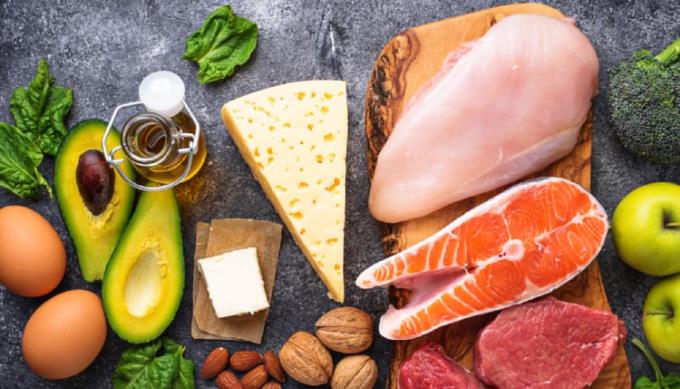Diet of pregnant mothers during the first month of pregnancy plays an important role in ensuring the nutritional needs of mothers and fetal growth and development.
During pregnancy, the proper nutrition of the pregnant mother plays an important role in the growth and development of the fetus. Health experts recommend that you take a vitamin supplement for pregnant women 3 months before conception.
In this article, aFamilyToday Health will guide you on what to eat and avoid in the first month of pregnancy.
The foods pregnant mothers should eat first month
You use the pregnancy test when you realize you have missed your period a few days and the result is a two-line pregnancy test . Congratulations, you are pregnant.
Carrying a little angel makes you more conscious of eating, living and being active. In addition, you should avoid consuming unhealthy snacks, cigarettes, alcohol, and drugs. The menu table for pregnant women during the first month of pregnancy should have lots of fruits and vegetables. Here are a few suggestions for you:
1. Milk and dairy products
Milk and dairy products have always been rich sources of calcium, vitamin D, protein, healthy fats and folic acid. During the first three weeks of pregnancy, in addition to adding milk, pregnant mothers should use more yogurt and cheese in the diet.
2. Folate-rich foods
Folic acid is essential for the neural tube development of the fetus. Therefore, in addition to taking folic acid supplements, pregnant mothers should include folate-rich foods in their diet.
Dark green leafy vegetables, asparagus, citrus fruits, beans, peas, cinnamon, avocado ... are folate-rich foods.
3. Whole grains
Whole grains are a source of healthy minerals like carbohydrates, fiber, multivitamins, iron, magnesium and selenium. They are essential for the healthy growth and development of your fetus.
Barley, brown rice, whole wheat bread, pasta, millet and oatmeal are the grains that first month pregnant mothers should eat.
4. Eggs
Eggs are a good source of protein, vitamins A, B, D, E and minerals like phosphorus, selenium, calcium and zinc. Pregnant mothers eat eggs and poultry in the first month of pregnancy to help ensure a healthy fetal development.
5. Fruit

Fruits like melons, avocados, pomegranates, bananas, oranges, strawberries and apples contain many vitamins, minerals and antioxidants necessary for your baby's growth.
6. Vegetables
Pregnant mothers should give preference to colorful vegetables. They will provide essential nutrients for the growing baby each day in the abdomen.
7. Nuts and dried fruits
Nuts and dried fruits are excellent sources of healthy fats, vitamins, proteins, minerals, flavonoids and fiber. Eating them regularly is not only beneficial for the fetus, but also good for pregnant women.
8. Fish
Fish is the best example of a high-quality, low-fat source. Fish is a good source of omega-3 fatty acids, vitamins B, D and E, as well as essential minerals like potassium, calcium, zinc, iodine, magnesium and phosphorus.
9. Meat
Meat is a rich source of vitamins, protein, zinc and iron. Eating meat in moderation during pregnancy is very healthy for both mother and baby. However, one thing to note is that you should eat well-cooked meat, not raw or undercooked meat.
The foods pregnant mothers should avoid first month
During the first month of pregnancy, pregnant women should avoid some of the following foods because they can harm the fetus and the health of pregnant women:
1. Soft cheese

Soft cheeses are made from unpasteurized milk that can contain harmful bacteria. Pregnant mothers who eat soft cheeses have the risk of food poisoning. Therefore, to stay healthy, you need to avoid consuming them.
2. Pre-packaged and processed food
The high levels of preservatives, sugar and sodium in packaged and processed foods such as juices, baked goods, confectionery ... are not good for you and your baby. In addition, some packaged and processed foods can also contain bacteria, mold ... that can cause food poisoning.
Pregnant mothers need to develop a habit of self-cooking at home with fresh products of natural or organic origin.
3. Seafood
Tuna, mackerel, herring, oysters ... are foods containing high levels of mercury. Mercury not only causes unpredictable effects on the health of the pregnant mother but also causes a negative impact on the fetal brain development. Therefore, pregnant mothers should avoid eating seafood during early pregnancy.
4. Green papaya
Green papaya has a lot of plastic (latex), which is responsible for uterine contraction, which can lead to miscarriage. Therefore, pregnant mothers who are pregnant in the first month should avoid eating raw green papaya.
However, cooked green papaya is rich in nutrients, so you can eat it in small amounts if your doctor does not recommend that you avoid it.
5. Pineapple
This fruit contains a substance called bromelain, which helps to soften the uterus. In the early part of pregnancy, pregnant mothers eat pineapple, which can lead to miscarriage.
6. Raw or undercooked meat
Raw or undercooked meat can be contaminated with bacteria, salmonella, listeria ... that can cause serious diseases and affect the health of pregnant mothers and fetal development . Ideally, you should avoid eating undercooked or undercooked meat for the health of both mother and baby.
7. Snacks
Some studies have shown that pregnant women eat too much junk food during pregnancy is linked to mental health problems like depression and anxiety. In addition, pregnant mothers eat too many of these foods during pregnancy, contributing to infant obesity.
8. Caffeine
If you have a habit of drinking coffee, when pregnant, you should limit the amount of caffeine consumed. Caffeine affects the user's nervous system and drinking too much can lead to irritability, irritability, and anxiety. This increases the risk of miscarriage.
9. Alcoholic beverages
Drinking alcohol by pregnant mothers will negatively affect the developing fetus and can lead to serious birth defects. Therefore, during pregnancy, pregnant mothers should absolutely not drink alcohol and consume other alcoholic beverages.
10. Sweets
A pregnant woman needs about 300 extra calories per day to ensure the growing fetus. Therefore, to add these calories to the body, pregnant mothers should eat fruits and nuts that are good for pregnant women, avoid consuming a lot of sweets. The reason is that pregnant mothers eat too many sweet foods that can lead to weight gain and gestational diabetes.
A few notes about diet during the first month of pregnancy

Here are a few things related to eating that pregnant mothers should be aware of when pregnant in the first month:
If you did not take vitamins before planning to become pregnant, especially folic acid, ask your gynecologist about the supplement and dosage to take.
Talk to your doctor or dietitian to find out how much of the food you should eat, and which foods you should prioritize and limit. Eating too much or too little has a negative impact on the health of both mother and baby.
Choose healthy and safe food.
Pregnant mothers should prioritize fruits and vegetables in the menu. You should eat fruit, nuts good for pregnant women instead of unhealthy snacks.
Drink enough water.
Develop a reasonable and regular regimen of physical activity.
During the first month of pregnancy, your body experiences a series of changes, such as hormonal changes, changes in mental status, fatigue, morning sickness and nausea. However, pregnant mothers can alleviate this situation by eating healthy foods, eating moderation, keeping the spirit at ease, exercising moderately and properly. This not only helps you have a healthy pregnancy while also helps your baby grow and develop well.














